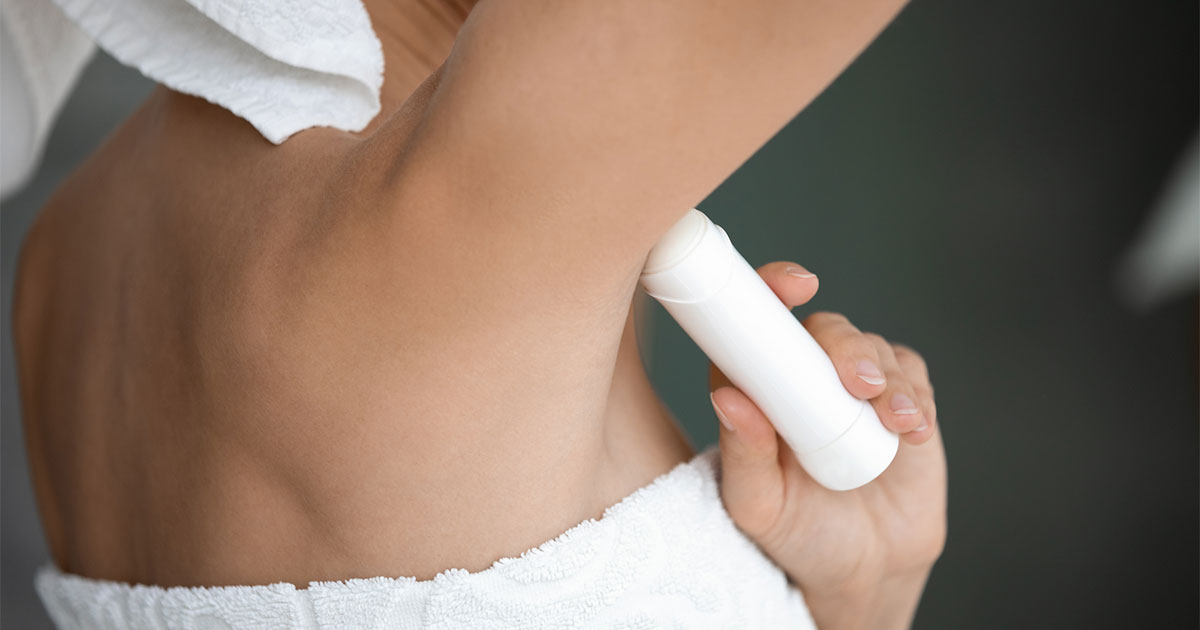
The routine is similar for many of us: Wake up, brush our teeth, take a shower, and then, we may reach for that stick of deodorant or antiperspirant. These products have a simple goal: prevent body odor. But are they dangerous to our health? The short answer: Researchers haven’t found any compelling evidence to suggest they are.
Over the years, claims have been made that deodorants or antiperspirants may cause cancer, specifically breast cancer, and a few studies have offered theories that seem to bolster the claims. But real evidence is lacking.
What’s the difference? Deodorant and antiperspirant
You may not realize that your sweat doesn’t stink—that is, until it mixes with the bacteria on your skin. Then your sweat releases an odor. Deodorants and antiperspirants work in different ways to mask or prevent body odor.
Deodorants work by blocking body odor with a presumably more pleasant scent. They may also create a more acidic environment where applied, which may prevent the bacteria from releasing odors.
Antiperspirants use ingredients, usually aluminum-based, to block sweat glands, reducing the amount of perspiration released.
The cancer question
The National Cancer Institute notes that “only a few studies” have investigated theories that the ingredients in body odor-fighting cosmetics may increase the risk of breast cancer. Some have postulated that the aluminum in these products may stimulate production of the hormone estrogen, which may lead to increased breast cancer risk. The theory is that aluminum may be absorbed through the skin, especially in women who shave their underarms, inadvertently causing small nicks or cuts. It’s through these small nicks to the skin that chemicals from the antiperspirant may gain access to the lymph nodes, which could cause cells to mutate and develop into cancer. Men would be at lower risk because most men don’t shave their underarms.
However, multiple studies have failed to cement the connection between these products and breast cancer.
A 2002 study that compared 813 women with breast cancer and 793 without revealed no link between breast cancer risk and antiperspirant use. “The use of antiperspirants had no association with the risk of breast cancer, while family history and oral contraceptives use were found to be associated,” a separate 2006 study concluded.
The concern over the link between breast cancer and antiperspirants gained some traction after a 2003 study observed that women who were diagnosed with breast cancer at a younger age were using antiperspirant and shaving their underarms more often than women diagnosed at an older age. The study surmised that a relationship may exist between those personal hygiene behaviors and a breast cancer diagnosis early in life. But other experts found no causal relationship between antiperspirant use, underarm shaving and breast cancer.
What are parabens?
Some of the research into deodorants and antiperspirants and cancer have focused on synthetic substances called parabens, a family of chemicals commonly used as preservatives in some cosmetics. Parabens, such as methylparaben, ethylparaben and propylparaben, may be found in shampoos, conditioners, skin creams, toothpaste and other personal care products. They are designed to inhibit the production of bacteria.
Some scientists are concerned that parabens may also mimic the activity of estrogen in cells. The U.S. Food and Drug Administration says it will continue to review the safety of parabens, but so far, it’s seen no evidence they cause breast cancer or any other health issues.
The bottom line: No studies have confirmed any connection between the use of deodorants and antiperspirants or their ingredients to increased cancer risk, so there’s no reason to break that morning routine.
Concerned about your cancer risk? Try our Risk Management Tool.



